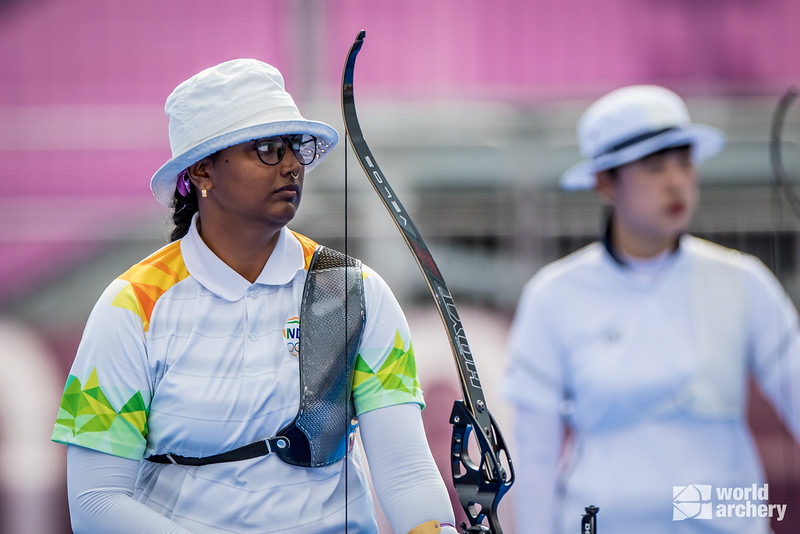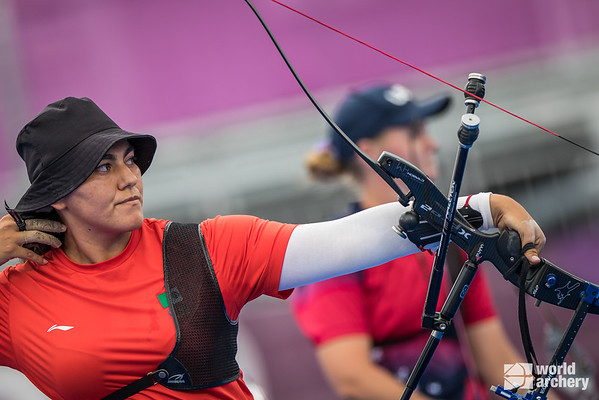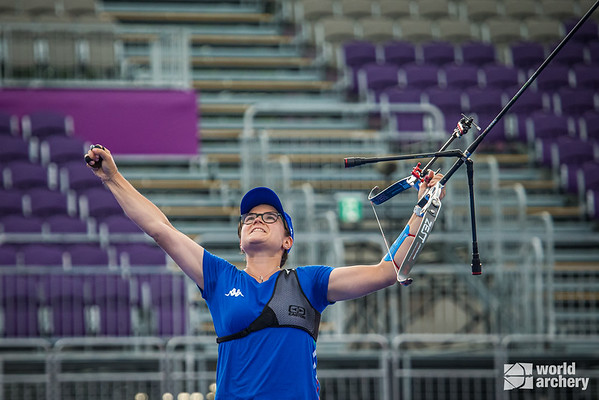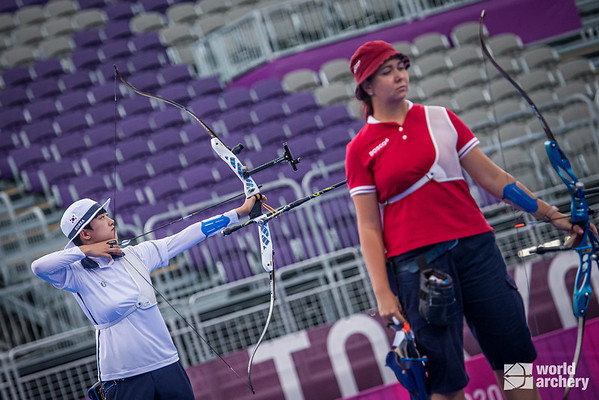The women’s individual competition concluded today at Yumenoshima Park, in a brooding, thundery atmosphere that saw visible lightning strikes just north of the field. There were a handful of surprises, some exceptional quality, and a well-deserved winner, fighting through exceptionally difficult circumstances.
The big hope for many – and for many reasons – was that Deepika Kumari could come through and win a first Olympic medal in archery, an event that would transform the landscape of the sport. It was not to be. Never looking comfortable on the stage, her shooting never hit the kind of sustained highs that she showed earlier this year. Despite coming through a match against the ever-dangerous Ksenia Perova in a shootoff, when she came up against the number one An San, the result was not really in doubt. An had already scythed through a nosebleed-level match against Ren Hayakawa of Japan and then destroyed Kumari 6-0, leaving her to face, as ever, the wrath of the Indian press demanding to know why she wasn’t on the podium.
An San shot 30, 26, 26 in that match, good enough, but not quite where she would need to be to take gold. However, compatriot Kang Chae Young, still probably then the favourite, had not looked comfortable the previous evening. She looked even less comfortable (and was pushed at least a little) by Turkey’s Yasemin Anagoz in the last 16, and then fell completely to pieces against the ROC’s Elena Osipova, who had hit a rich seam of form and looked like she was positively enjoying herself. (Osipova was fresh from mercilessly dispatching GBR’s Bryony Pitman, without dropping a set.) “The Destroyer”, destroyed. Kang left to face the press, looking relieved, and laughing at a joke or two, before breaking down in tears and having to be helped out of the mixed zone by her coach.
Wherever Mackenzie Brown had conjured form from, she was astonishingly good in Tokyo. Afew years ago, she surfed into public consciousness on a wave of hype before the Rio Games, but had sunk ignomiously in Brazil. Wilderness years followed, and her scores were up and down, and many thought she was gone, as Casey Kaufhold rose and rose to become the most prominent USA women’s recurver.
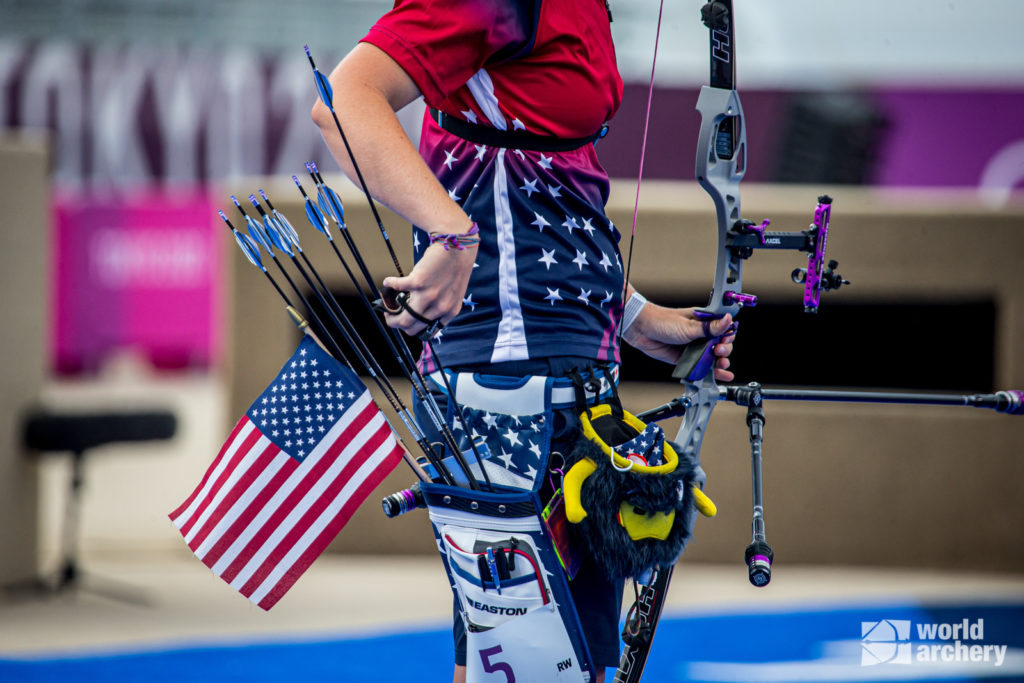
Here in the Tokyo swamp heat, Casey had gone nowhere and Mackenzie had pounded her bracket; qualifying in fifth, easily pushing through to the last day, and then beating Lin Chia-En of Chinese Taipei. She then came through a battle against Alejandra Valencia of Mexico – who placed individual fourth in Rio – to make the last four with some focused, tight, and disciplined arrows.
It may well be remembered as one of the more extraordinary USA runs of recent times. Alejandra, for her part, was leading at many points and essentially threw the match away, failing to close out sets. The shootoff could have gone either way – the margin of victory was just 12mm – but Mackenzie would fight through. Her semifinal match against An San was full of fire, a classic and well worth a re-watch. Neither woman gave an inch, both pulled strong, and it was clear from the gun that any mistakes would sink the boat. Mackenzie shot 29, 28, 28, 30 and 28, but An pulled back to back 30s out of the bag. The shootoff wasn’t fair, but it was inevitable. An San would shoot for gold.
But first, Lucilla Boari – perhaps not the most expressive member of the Italian team – had ridden some strength and more luck and coasted to the last stages. Against Osipova, she tightened back up, the Russian found fourth gear, and there was no way back. It was done long before the final buzzer. Boari looked through the scope at the end, like something might change.
It was Boari and Brown for the bronze, Mackenzie seemed to have lost none of her timing and snap, but she was edged out by a surging Boari each time. A rotten seven at the last almost let the American back in, but Boari found the last ten she needs. It was good – they were both good – but Mackenzie will leave in fourth place, with nothing.
Boari left in fourth place in Rio, in the team event (where Italy deserved to lose), whereas Brown had barely put a bullet out of the gold in three matches. She didn’t deserve to leave here empty handed, but she did. It was, somewhat incredibly, the first women’s Olympic medal for Italy – ever.
Finally, An San would shoot against Osipova for the gold, against a backdrop that must have worried the Korean camp mightily. Almost overnight, a story had blown up about a deluge of online hate aimed at An – already with two gold medals – and focusing, it seemed on her… short hair. It was a story that touched upon many things, including some particularly antediluvian attitudes in Korea, but apparently enough trolls had marked An out as a ‘feminist’, because of the way she cut her hair.
The night before, during the final qualifiers, one of the Korean press corps that had been camping out in the venue media centre asked her a question about it, and was instantly shut down by Park Chaesoon, the senior hand here and the best known member of the coaching team.
Earlier today, that same journalist and many more lined up on the rail in the mixed zone where the press meet the athletes, as An San faced the media. Chaesoon stood right next to her, arms folded, and loudly proclaimed that his charge would not answer ‘irrelevant’ questions. The journalists backed down, but it reinforced the story’s importance. By Friday evening, dozens and dozens of Korean press and photographers jammed the venue for the denouement.
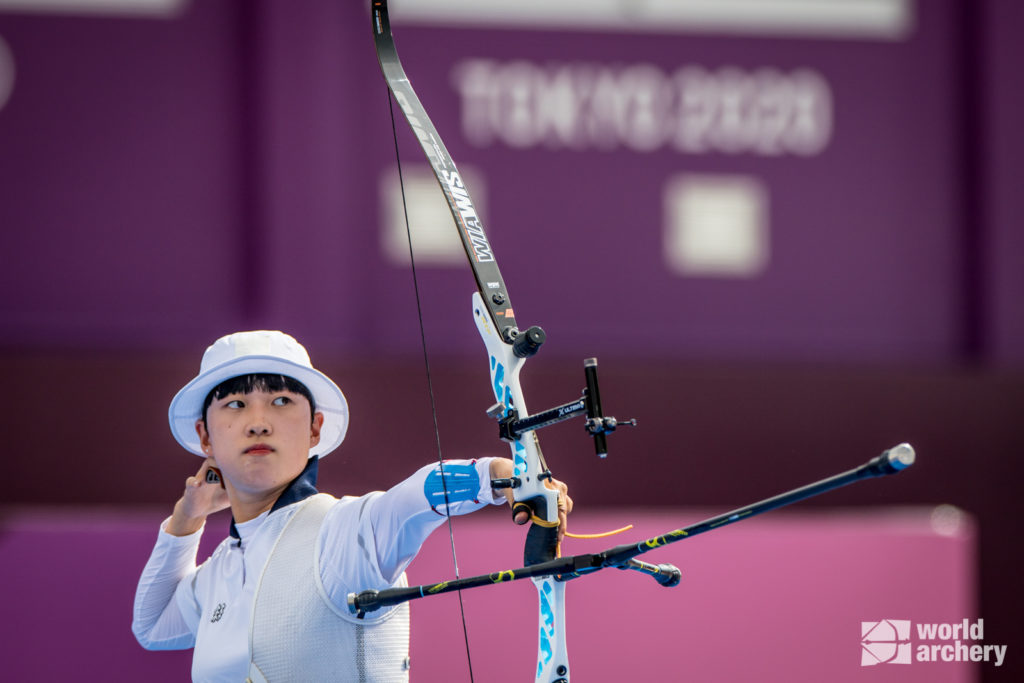
It was time. Both An and Osipova looked like they wanted to be there. In the first end, An hesitated, half came down, came back to anchor, and drilled an incredible ten. It set the tone. It was mesmerisingly good, from the off. Osipova pushed back hard in the third and fourth, as An seemed to twitch, and slip into the nine. The Russian went 5-3 up, and An’s face flickers with doubt, but Osipova couldn’t quite close it out. Six edgy arrows later, it’s all square. A shootoff – just like the women’s final at London 2012.
It deserved to be. You couldn’t quite put anything between them. An’s talent is so raw and so potent, but she had met an extraordinary force, mining a seam of winning form. As they replaced the target faces, you felt that literally anything could happen, and neither would deserve to lose. A coinflip.
An is up first. It’s a ten, but it’s beatable. The heartrate monitor reads 119. Osipova’s reads 167. She doesn’t get there. The moment is past. It’s an eight, and Korea continue the golden run, led by, it seems, one of the greatest talents we will see at an Olympics in our lifetime. She has become the first archer to win three gold medals at the same Olympics in the history of the modern event, and for the first time this week, breaks down on the podium. An San, small, blinking, doesn’t look ready for this at all, as she walks off the stage, rolls her eyes, and runs the gamut of the broadcast press.
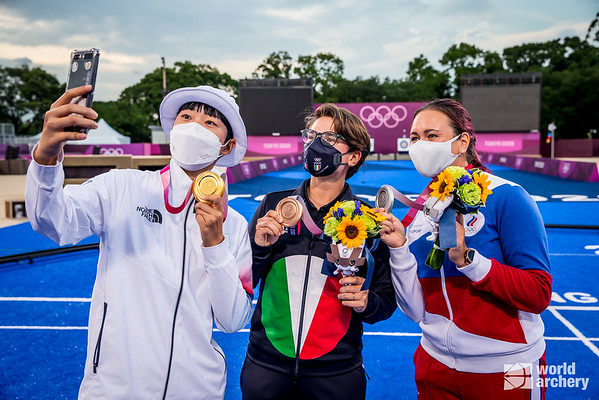
Finally, she is dragged through the throng to sit at a table in the venue media centre with an animated Boari and a beaming Osipova. Someone sneaks through the protective safety net and asks her a question about what she would say to the people who have insulted her online. In a few clipped words, she answers: “I will not like to talk about anything but the competition and my skills and techniques.”, and went on to praise her coaches. Not long afterwards, none other than the President of South Korea described her as “the pride of Korea” the same evening, and went as far as to say: “Sometimes we have to fight over expectations and discrimination. Sometimes we only see the results, but every step of the process is never easy.”
You sense that this story, and her story is far from over – now, tomorrow and perhaps for many years to come.
The competition concludes with the men’s individual finals tomorrow.


